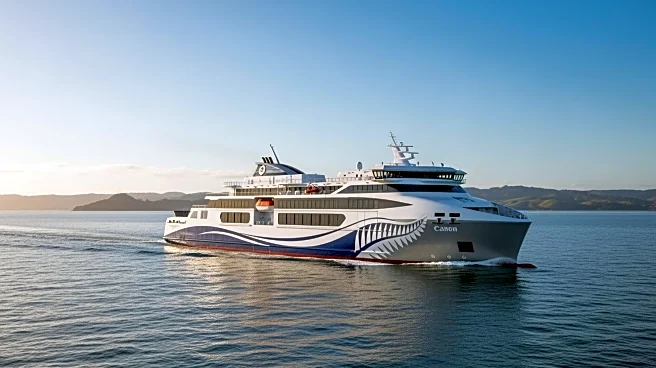What's Happening?
New Zealand authorities have chosen Guangzhou Shipyard International (GSI) from China to construct two new interisland ferries, marking a significant development in the country's ferry replacement program.
Rail Minister Winston Peters announced the decision, emphasizing the competence and capability of GSI as a shipbuilder. The project, which has faced political challenges and financial setbacks, aims to provide a 'no-nonsense solution' with a fixed price and delivery date set for 2029. The new ferries will be 200 meters long, accommodating 1,500 passengers, with extensive lanes for trucks and rail cars. This initiative follows the termination of a previous contract with South Korea's HD Hyundai, which was ended in 2023 after the government spent approximately $380 million on the project. The new ferries are expected to operate across the Cook Strait for the next 30 years, requiring infrastructure upgrades at the ports due to their larger size compared to the current fleet.
Why It's Important?
The selection of a Chinese shipbuilder for New Zealand's ferry project underscores the strategic importance of international partnerships in infrastructure development. This decision is crucial for New Zealand's transportation sector, as it aims to modernize its ferry services and enhance connectivity across the Cook Strait. The project promises economic benefits by potentially reducing costs for taxpayers and improving operational efficiency. The new ferries are expected to address the operational challenges faced by KiwiRail, which has a history of troubled operations. The initiative also reflects New Zealand's commitment to upgrading its transportation infrastructure, which is vital for economic growth and regional connectivity. Stakeholders, including taxpayers and businesses relying on interisland transport, stand to benefit from improved services and reduced operational disruptions.
What's Next?
The next steps involve finalizing contract negotiations with Guangzhou Shipyard International and establishing new port agreements to accommodate the larger ferries. The government plans to announce detailed contracts by the end of the year, ensuring transparency and accountability in the process. Infrastructure upgrades at the ports are necessary to support the new vessels, which will be larger than the current fleet. KiwiRail's recent sale of the Aratere ferry for recycling indicates a shift towards modernizing its fleet, with environmental considerations in mind. The successful implementation of this project could set a precedent for future infrastructure developments in New Zealand, potentially influencing policy decisions and international collaborations.
Beyond the Headlines
The decision to select a Chinese shipbuilder highlights the geopolitical dimensions of international trade and infrastructure development. It reflects New Zealand's willingness to engage with global partners to achieve strategic goals, despite potential political controversies. The project also raises questions about environmental standards and sustainability, as KiwiRail ensures due diligence in recycling the retired Aratere ferry. This move aligns with global trends towards environmentally responsible practices in the shipping industry. The long-term implications of this project could influence New Zealand's transportation policies and its role in international maritime trade.









